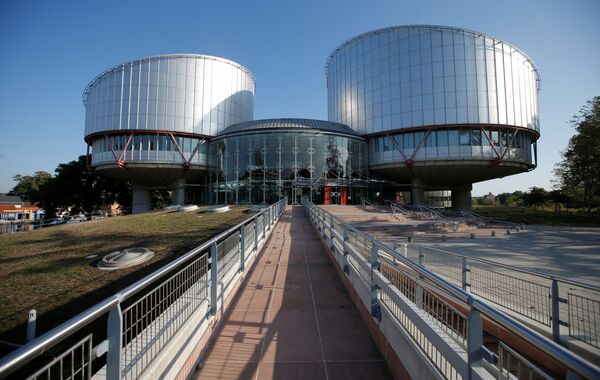Joaquin Flores, Chief Editor of Fort Russ News and Director of the Center for Syncretic Studies, believes that placing Russian high-ranking official to notorious Ukraine's database won't dramatically change anyone's point of view regarding relations between Russia and Ukraine.
Sputnik: Russia's Representative to the ECHR, Deputy Justice Minister Mikhail Galperin, was put into the Myrotvorets database after recent court hearings. Can we speak about Ukraine's attempt to politicise the whole process? Can this be considered pressure on the ECHR itself?
Joaquin Flores: Of course Galperin's addition to the Myrotvorets database won't have any effect of influencing anyone - everyone is already decided one way or the other. No one seriously believes that the nature of Myrotvorets as an unofficial non-agency simply curated by Ukrainian intelligence officials lends it any credibility. It is a strange way that the US and Ukraine have opted to remain at arm’s length regarding their own claims. When one ponders their own lack of commitment to their own claims, it becomes evident why those who haven't politicised against the obvious justice questions at play, aren't swayed.
In that sense, it is a weak attempt at creating smoke that may be though to give the ECHR some pretext, albeit questionable, to make a decision contrary to its own interests. The ECHR has been pretty clear that it won't make decisions that could risk Russia's withdrawal from the Council of Europe.
Just as odd as the Myrotvorets stunt is that the claims made involve evidence produced by Bellingcat, which does not have any official standing before international bodies, and they have been previously shown to have manufactured evidence, and their evidence could be rejected on that basis. Russia would certainly claim that Bellingcat either manufactured evidence intentionally or that their patterns of errors in the past make this evidence too difficult to have an opinion in terms of admissibility.
Sputnik: What reaction may we expect from the ECHR?
Joaquin Flores: The ECHR is being asked to make a determination outside of the scope of the presented facts. To begin with, the claim that the Russian 'occupation' of Crimea has resulted in the violation of the Human Rights of, for example, Tatars and protected minorities, assumes that Russia has annexed Crimea.
So this brings to issue many strange twists. In consulting experts on international law and sovereignty, in the precedence established in past rulings from the ECHR, we received some interesting opinions. Ukraine and the US seem to want to skip ahead of any determination on the question of the occupation itself, use that as a foregone conclusion, and move immediately to questions about which rights were or weren't violated in the course of this alleged occupation. Yet they realize the court would have to rule on that in order to rule on the specifics in the way they are claimed.
This may have a backlash against Ukraine - more reasonable if the rights of people were concerned, were for those people to file as Russian citizens. The process as it is has the claimants as Ukrainians under occupation. This raises serious questions of admissibility for the ECHR to move on this in a way that Ukraine might want.

In the pre-trial briefings, the court asked the parties - Ukraine and Russia - on what basis it wanted any determination to be made. Both parties agree that Russia has control over Crimea, but Ukraine also wanted the court to rule on the legality of such control. Russia does not want the court to rule on this.
This is where the nominal case presented - human rights - exceeds the expected questions the court sought to weigh on when looking at the viability of the case.
The much larger framing issue would be if Russia is illegally in control of Crimea, and this is a turn from what the initial suit revolves around in narrow terms.
Sputnik: The court is expected to decide on whether to move forward with the case by the end of the year. What would be the possible outcome, in your view?
Joaquin Flores: From what we understand, the court may – sooner than later – respond to Ukraine that while it can be involved in pursuing the process for a ruling given that the citizens in question maintain and affirm their Ukrainian citizenship, it is not necessary to determine if Russia is illegally in control of Crimea. It is agreed by all parties that Russia is at least de facto in control of Crimea.
The court doesn’t need to rule on the legality of Russia’s control, nor does it help the Council of Europe maintain the membership of the Russian Federation – something which the Council of Europe affirmed the importance of last June in its ruling then.
It would seem that what Ukraine really wanted was a ruling on the legality of control. Then the nominal case of human rights would be through that lens, one which is much more geopolitical than it needs to be otherwise.
Those individual citizens claiming persecution for their activism to see Crimea return to Russia would perhaps have a better chance of getting a favourable ruling if Russia is seen as legitimately being in control of Crimea. If the court does not address this, which it is likely to not, it becomes much less clear.
Questions of human rights of people under an occupation may be more able to be resolved within international bodies, whereas if the question is not addressed, then we would probably presume a finding or judgment not based on whether Russia has treated these citizens on an equal basis, as compared to other dissidents in the Russian Federation.
While on the one hand, occupied people have a right to resist, there are conflicting views on whether this resistance can take the form of violence, sabotage, obstruction, etc., while still maintaining that the occupying force can reasonably see through its obligation to see to the basic rights to livelihood of people under occupation – which do not include nominally democratic rights as such.
The claims surrounding the national oppression of Crimean Tatars might cut the opposite direction, for myriad other reasons, and place those claims at odds with the claims of individual dissidents against the alleged occupation.
All together, because Europe is moving in a conciliatory direction with Russia, and the Council of Europe in particular, which oversees the ECHR, we might expect the ECHR to direct the claimants to refile on a different basis if such a procedure exists, or we should expect that the ECHR will be forced to not directly answer the question of the legality of the Russian control of Crimea, and therefore defer to a position of the least wrong-doing on the part of Russia. That is, while not making a finding on that question, they certainly would not want to treat the claimants as if they are under occupation, de facto making their ruling based upon the presumption of legitimate Russian control of Crimea.
The views and opinions expressed in the article do not necessarily reflect those of Sputnik.

